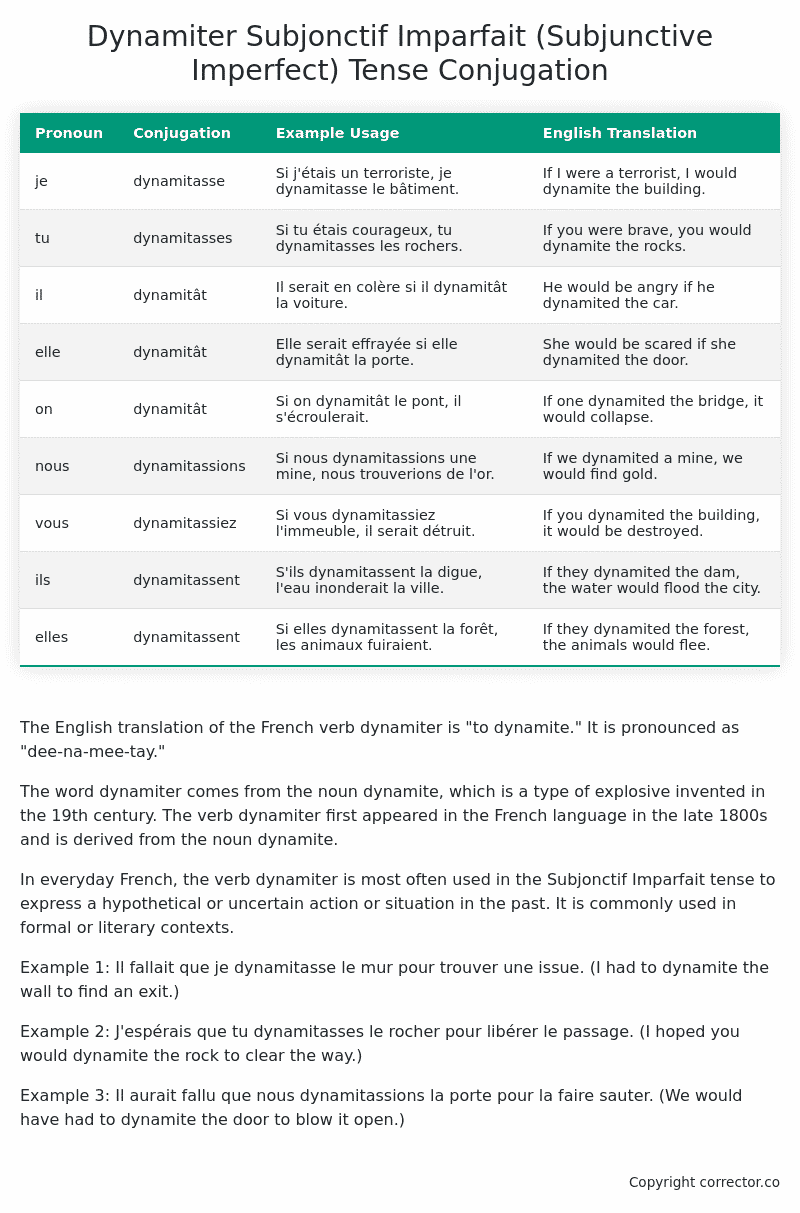Subjonctif Imparfait (Subjunctive Imperfect) Tense Conjugation of the French Verb dynamiter
Introduction to the verb dynamiter
The English translation of the French verb dynamiter is “to dynamite.” It is pronounced as “dee-na-mee-tay.”
The word dynamiter comes from the noun dynamite, which is a type of explosive invented in the 19th century. The verb dynamiter first appeared in the French language in the late 1800s and is derived from the noun dynamite.
In everyday French, the verb dynamiter is most often used in the Subjonctif Imparfait tense to express a hypothetical or uncertain action or situation in the past. It is commonly used in formal or literary contexts.
Example 1: Il fallait que je dynamitasse le mur pour trouver une issue. (I had to dynamite the wall to find an exit.)
Example 2: J’espérais que tu dynamitasses le rocher pour libérer le passage. (I hoped you would dynamite the rock to clear the way.)
Example 3: Il aurait fallu que nous dynamitassions la porte pour la faire sauter. (We would have had to dynamite the door to blow it open.)
Table of the Subjonctif Imparfait (Subjunctive Imperfect) Tense Conjugation of dynamiter
| Pronoun | Conjugation | Example Usage | English Translation |
|---|---|---|---|
| je | dynamitasse | Si j’étais un terroriste, je dynamitasse le bâtiment. | If I were a terrorist, I would dynamite the building. |
| tu | dynamitasses | Si tu étais courageux, tu dynamitasses les rochers. | If you were brave, you would dynamite the rocks. |
| il | dynamitât | Il serait en colère si il dynamitât la voiture. | He would be angry if he dynamited the car. |
| elle | dynamitât | Elle serait effrayée si elle dynamitât la porte. | She would be scared if she dynamited the door. |
| on | dynamitât | Si on dynamitât le pont, il s’écroulerait. | If one dynamited the bridge, it would collapse. |
| nous | dynamitassions | Si nous dynamitassions une mine, nous trouverions de l’or. | If we dynamited a mine, we would find gold. |
| vous | dynamitassiez | Si vous dynamitassiez l’immeuble, il serait détruit. | If you dynamited the building, it would be destroyed. |
| ils | dynamitassent | S’ils dynamitassent la digue, l’eau inonderait la ville. | If they dynamited the dam, the water would flood the city. |
| elles | dynamitassent | Si elles dynamitassent la forêt, les animaux fuiraient. | If they dynamited the forest, the animals would flee. |
Other Conjugations for Dynamiter.
Le Present (Present Tense) Conjugation of the French Verb dynamiter
Imparfait (Imperfect) Tense Conjugation of the French Verb dynamiter
Passé Simple (Simple Past) Tense Conjugation of the French Verb dynamiter
Passé Composé (Present Perfect) Tense Conjugation of the French Verb dynamiter
Futur Simple (Simple Future) Tense Conjugation of the French Verb dynamiter
Futur Proche (Near Future) Tense Conjugation of the French Verb dynamiter
Plus-que-parfait (Pluperfect) Tense Conjugation of the French Verb dynamiter
Passé Antérieur (Past Anterior) Tense Conjugation of the French Verb dynamiter
Futur Antérieur (Future Anterior) Tense Conjugation of the French Verb dynamiter
Subjonctif Présent (Subjunctive Present) Tense Conjugation of the French Verb dynamiter
Subjonctif Passé (Subjunctive Past) Tense Conjugation of the French Verb dynamiter
Subjonctif Imparfait (Subjunctive Imperfect) Tense Conjugation of the French Verb dynamiter (this article)
Subjonctif Plus-que-parfait (Subjunctive Pluperfect) Tense Conjugation of the French Verb dynamiter
Conditionnel Présent (Conditional Present) Tense Conjugation of the French Verb dynamiter
Conditionnel Passé (Conditional Past) Tense Conjugation of the French Verb dynamiter
L’impératif Présent (Imperative Present) Tense Conjugation of the French Verb dynamiter
L’infinitif Présent (Infinitive Present) Tense Conjugation of the French Verb dynamiter
Struggling with French verbs or the language in general? Why not use our free French Grammar Checker – no registration required!
Get a FREE Download Study Sheet of this Conjugation 🔥
Simply right click the image below, click “save image” and get your free reference for the dynamiter Subjonctif Imparfait tense conjugation!

Dynamiter – About the French Subjonctif Imparfait (Subjunctive Imperfect) Tense
Formation
Common Everyday Usage Patterns
Interactions with Other Tenses
Subjonctif Présent
Indicatif Passé Composé
Conditional
Conditional Perfect
Summary
I hope you enjoyed this article on the verb dynamiter. Still in a learning mood? Check out another TOTALLY random French verb conjugation!


